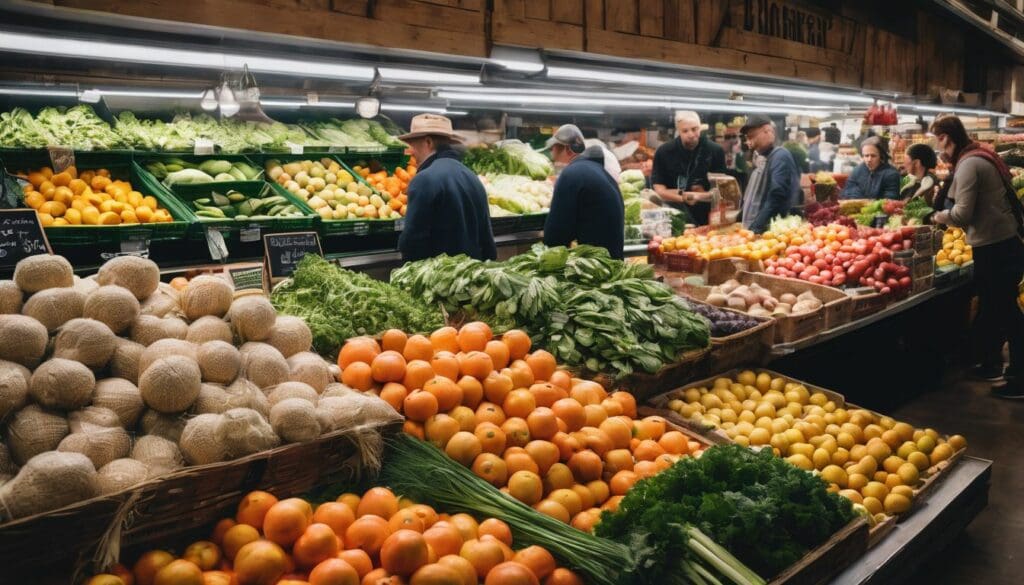Everyone is looking for ways to eat healthier and support their community. Food co-ops have exploded in popularity, bringing fresh, local produce right to our doorsteps. This blog will explore how these cooperative stores are changing the way we shop, eat, and interact with our neighbours.
Dive in to discover a food revolution!
Key Takeaways
- Food co – ops support local economies by purchasing directly from regional farmers and makers, which helps to create jobs and keep money circulating within the community.
- Co-operative grocery stores make healthy, organic food more affordable and accessible, connecting people with fresh produce while also promoting eco-friendly practices.
- These co-ops foster a sense of community through their focus on inclusivity in employment opportunities and collaboration with small non-profits and organisations.
- By prioritising sustainability, food co-ops reduce environmental impact through shorter supply chains for goods, thus supporting a biodiverse planet.
- The growth of food co – operatives represents an emerging trend towards conscious consumerism that values social responsibility, healthful living, and strong local communities.
What are Food Co-ops and their Purpose?
Food co-ops are community-owned grocery stores with the purpose of supporting local farmers and makers, providing affordable, healthy food, building community connections, and promoting sustainability.
Supporting local farmers and makers
Buying from food co-ops directly aids local farmers and small-scale producers, injecting money back into the community’s economy. This support helps maintain traditional farming methods and encourages a resurgence of artisanal crafts, securing jobs for those in rural areas.
By choosing locally sourced products, consumers reduce their carbon footprint due to shorter transport distances for goods.
Local makers thrive when food co-ops prioritise their handicrafts and produce on the shelves. They provide an important platform for these vendors to reach a wider audience, fostering diversity in product offerings and highlighting unique cultural flavors.
Co-op shoppers become champions of sustainability by investing in the welfare of the people who cultivate and craft their food and goods.
Providing affordable, healthy food
Supporting local farmers and makers ensures that food co-ops can provide affordable, healthy options for environmentally conscious individuals. By prioritising locally grown and produced food, co-ops promote access to fresh, nutritious products without the added costs of transportation and distribution.
This not only benefits consumers but also supports sustainable agriculture practices while reducing environmental impact.
In addition to positively impacting the environment, focusing on affordability enables more people to access healthier food options, contributing to a more sustainable and health-conscious community.
Building community connections
Food co-ops build community connections by connecting consumers directly with local farmers and food producers. Members also have the chance to engage through volunteering and participating in decision-making processes, creating a sense of ownership within the community.
These connections foster an environment where individuals can share knowledge and experiences related to sustainable, healthy living while supporting local businesses and organisations.
Through events like farmer’s markets or cooking workshops, co-ops actively encourage diverse groups to interact, ultimately strengthening social bonds within the community.
Creating opportunities for collaboration among different parts of the food system such as farms, distribution centres, and consumers helps to establish resilient relationships that endure beyond transactions.
Promoting sustainability
Food co-ops play a vital role in promoting sustainability by prioritising eco-friendly practices and sourcing local, organic produce. They reduce the carbon footprint by supporting regional farmers and makers, thus minimising transportation emissions.
Embracing reusable packaging and advocating for waste reduction, they actively contribute to environmental conservation efforts. Moreover, food co-ops educate communities about sustainable farming methods and provide access to ethically produced goods, fostering an environmentally conscious lifestyle.
Demonstrating commitment to biodiversity and eco-responsibility, food co-ops influence consumers’ choices towards green living. By encouraging support for local businesses with renewable practices, these co-ops are actively advancing sustainable initiatives within their communities while setting an example of environmental stewardship that resonates far beyond their immediate reach.
Impact on Local Communities
Food co-ops boost local economic activity, improve access to fresh, local food, and create inclusive job opportunities. To learn more about the positive impact of food co-ops on communities, keep reading!
Boosting economic activity
Food co-ops bolster local economies by supporting small-scale farmers and producers, stimulating business growth in rural and urban areas. They facilitate the creation of new jobs, ensuring that economic activity circulates within the community, promoting sustainability and resilience.
Supporting food co-ops means contributing to the financial health of your local area while championing ethical consumption and community development. By choosing to engage with these cooperatives, you actively participate in promoting a thriving local economy driven by social responsibility and sustainable practices.
Improving access to fresh, local food
Improving access to fresh, local food supports local farmers and ensures that communities have a diverse range of healthy produce. It fosters sustainability and reduces the environmental impact of long-distance transportation.
Co-ops promote the availability of organic fruits, vegetables, dairy, and meat from nearby farms, providing an affordable way for individuals to access high-quality products while supporting their local economy.
By advocating for the consumption of locally sourced food, co-ops make it easier for people to enjoy fresh options without reliance on mass-produced items that may have travelled long distances before reaching consumers.
Creating inclusive job opportunities
Food co-ops play a pivotal role in creating inclusive job opportunities within local communities. By prioritising hiring from the community, food cooperatives foster diverse and equitable workplaces, offering employment to individuals from various backgrounds and skill sets.
This approach not only supports small businesses but also contributes to building strong, supportive relationships within the local area as part of their commitment to social impact.
Moreover, food co-ops provide unique work opportunities that align with their values of sustainability and community support. They actively engage in empowering individuals through meaningful career paths while catalysing positive change in the local economy.
How Food Co-ops Serve Communities
Food co-ops serve communities by creating inclusive job opportunities, providing affordable, healthy food and supporting small non-profits and organisations. They also promote local makers and diversity within the community.
Career opportunities
Working in a food co-op presents diverse career opportunities for those passionate about sustainable living. Whether it’s managing community outreach, coordinating local suppliers, or overseeing financial operations, co-ops offer a range of meaningful roles.
Emphasising innovation and social responsibility, these positions align with the values of environmental conservation and community impact. From supporting small-scale farmers to promoting access to healthy foods, being part of a food co-op team allows individuals to contribute directly to positive change in their local communities.
Career advancement within a food co-op involves working collaboratively with diverse non-profit organisations and tribal groups. Professionals have the chance to network within an inclusive environment that encourages skill development while championing diversity and inclusion.
Food affordability
Food co-ops prioritise food affordability, ensuring that fresh and healthy produce is accessible to all members of the community. By working directly with local farmers and producers, they cut out middlemen, keeping prices reasonable for everyone.
This approach supports small organisations while offering sustainable and budget-friendly options for individuals and families.
Co-op values in action deliver on their promise of affordable, healthy food, benefiting both the community and the planet. The next section explores how food co-ops support small non-profits and organisations within their communities as part of their commitment to sustainability.
Supporting small non-profits and organisations
Food co-ops play a crucial role in supporting small non-profits and organisations within the community. By sourcing products from local makers, farmers, and producers, co-ops contribute to the sustainability of these small businesses.
Additionally, through collaborations with non-profit organisations focused on food security and education, co-ops provide valuable support for schools and tribal organisations. This collaborative approach fosters a sense of unity and shared purpose within the community.
The involvement of food co-ops in supporting small non-profits and organisations reflects their commitment to promoting diversity and inclusivity in their supply chain while contributing to the overall economic well-being of local communities.
With an emphasis on ethical business practices and social responsibility, food co-ops serve as catalysts for positive change within their surrounding areas.
Promoting local makers and diversity
Food co-ops support local makers by showcasing and selling their products, allowing them to reach a wider audience. By highlighting the unique offerings from small producers, food co-ops encourage diversity in the marketplace and celebrate the creativity of local artisans.
This commitment to promoting local makers strengthens community connections and fosters a sense of pride in supporting homegrown talent.
In addition to promoting local makers, food co-ops also champion diversity by offering a wide range of culturally diverse products that cater to different dietary preferences and traditions.
Celebrating variety is at the heart of what they do, ensuring that everyone feels welcome and represented in their product selection. This inclusive approach creates an environment where individuals can explore new tastes while reinforcing the importance of embracing cultural differences.
Co-op Values in Action
Food co-ops embody their values by prioritising ethical business practices, creating a safer and just supply chain, and promoting a biodiverse planet. To learn more about the impact of food co-ops on local communities, keep reading!
Business with principles
Food co-ops prioritise ethical practices and sustainability, incorporating principles like fair trade and environmental stewardship into their business model. By supporting local farmers and makers, these co-ops uphold the values of community-based economics.
They actively contribute to a safer supply chain by promoting transparency and ensuring fair compensation for producers. Their commitment to a biodiverse planet serves as a driving force in fostering an eco-friendly food system that benefits both people and the environment.
Operating with integrity, food co-ops strive to maintain a just supply chain, upholding the values of fairness, equity, respect, and concern for the environment while providing affordable access to healthy food choices.
Safer and just supply chain
Supporting a biodiverse planet, food co-ops ensure a safer and just supply chain. By prioritising ethical sourcing and fair trade practices, co-ops contribute to sustainable agriculture while advocating for the rights of workers within the supply chain.
Co-op initiatives promote transparency and accountability, ultimately creating a more equitable system that benefits producers, communities, and consumers alike.
In upholding their values, food co-ops actively challenge exploitative business models within the supply chain while championing environmentally conscious practices. This commitment not only fosters healthier ecosystems but also ensures fair treatment for all individuals involved in the production and distribution of goods.
Promoting a biodiverse planet
Food co-ops play a crucial role in promoting a biodiverse planet by sourcing and selling products that support sustainable agriculture. Through prioritising locally grown and organic produce, they reduce the demand for industrially produced food, which can have detrimental effects on biodiversity.
By offering a platform for small farmers and local makers to showcase their products, co-ops help promote agricultural diversity. This not only supports the local economy but also encourages practices that are more mindful of the environment.
Moreover, food co-ops often engage in educational activities aimed at raising awareness about the importance of biodiversity conservation. By providing information about sustainable farming methods and promoting eco-friendly products, they actively contribute to creating communities that are more conscious of their impact on the planet’s biodiversity.
Conclusion
In conclusion, food co-ops positively impact local communities by boosting economic activity and improving access to fresh, local food. They also create inclusive job opportunities and support small non-profits and organisations, promoting diversity and sustainability.
Through their values in action, they contribute to a safer and just supply chain while also advocating for a biodiverse planet.
FAQs
1. What are food co-ops and why are they on the rise?
Food co-ops are member-owned organisations where people come together to buy food in a way that supports their community, and they’re becoming more popular as folks look for ways to make a difference locally.
2. Who can join these non-profit food co-ops?
Anyone from small organisation workers to tribal organisation members or individuals interested in supporting non-profits can become members of a food co-op.
3. Do you have to be a member to shop at a food co-op?
No, while being a member often comes with benefits, many food co-ops welcome non-members to shop and learn about their positive community impact.
4. How does my membership support the community through the rise of food co-ops?
Your membership helps boost local economies, supports fair trade practices, strengthens non-profit missions, and fosters a sense of belonging among neighbours.





